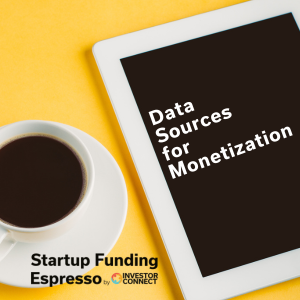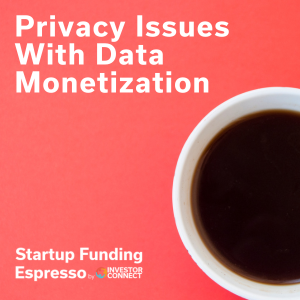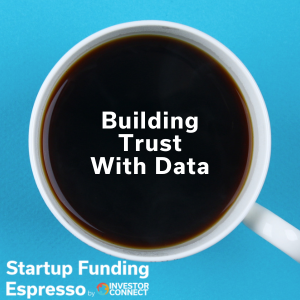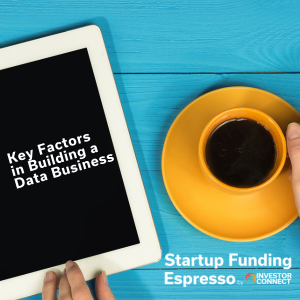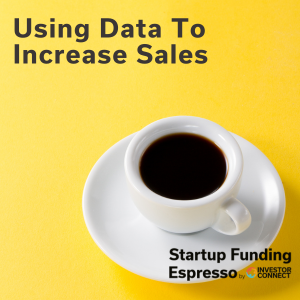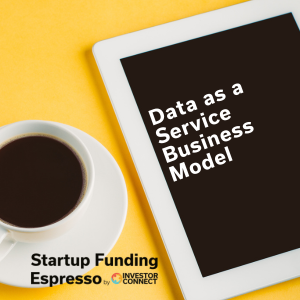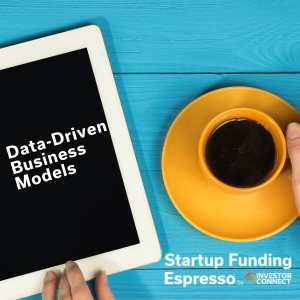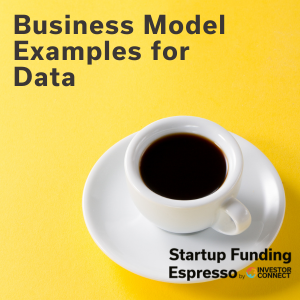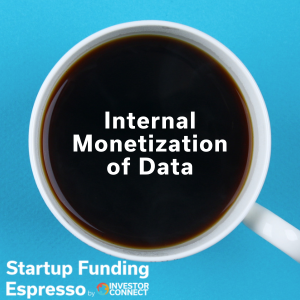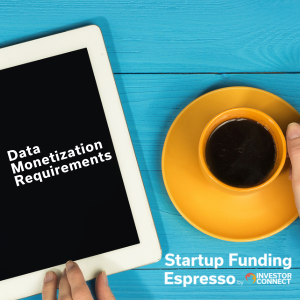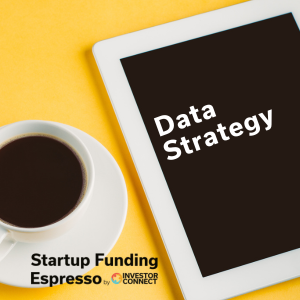Discover Investor Connect Podcast
Investor Connect Podcast

Investor Connect Podcast
Author: Hall T Martin
Subscribed: 49Played: 4,472Subscribe
Share
© copyright InvestorConnect
Description
Hall T Martin interviews angel and venture capital investors on how they invest and talks with CEOs who discuss their sector and what to look for. Hall T Martin also leads the Startup Funding Espresso series in which you can learn about startup funding and investing in the time it takes to have an espresso.
https://investorconnect.org/
https://investorconnect.org/
2108 Episodes
Reverse
Data Champions Hello, this is Hall T. Martin with the Startup Funding Espresso -- your daily shot of startup funding and investing. Moving your company into the data world can be a challenge as it’s a new space and many are not familiar with it. Consider the Crossing the Chasm paradigm by Geoffrey Moore in which new technologies start with early adopters and technologists. In building data activity into your business start with these two types before moving into the mainstream. Take your early adopters and turn them into data champions. Early adopters are often domain knowledge specialists. They get excited about new technologies and new ways of doing things. They have an innate curiosity that drives them to work on new areas. They are often fast learners and pick up new skills quickly. Bring them into the program to work on the initial projects. Give them a voice in the decision-making process. Make clear to everyone they are working on the project and making a valuable contribution. It’s not necessary to give formal positions in the company although titles can be helpful. Give them air time to showcase the results of the data project so everyone is aware of it. By creating data champions you can encourage others in the group to join in. Thank you for joining us for the Startup Funding Espresso where we help startups and investors connect for funding. Let’s go startup something today. _______________________________________________________ For more episodes from Investor Connect, please visit the site at: Check out our other podcasts here: For Investors check out: For Startups check out: For eGuides check out: For upcoming Events, check out For Feedback please contact info@tencapital.group Please , share, and leave a review. Music courtesy of .
Data Sources for Monetization Hello, this is Hall T. Martin with the Startup Funding Espresso -- your daily shot of startup funding and investing. In a startup there are many sources of data to draw from for monetization. You can capture primary data from your own systems. Consider this list for gathering data from your startup: Start with your customer database or CRM. Review the webforms that capture inbound user traffic. Review your online and mobile ads for data sources. Research surveys your company has done. Check your email subscription list. If you have a community of users, review the constituency for affiliations. Check social media follows, likes, and other interactions. Review your financial payments system for sources of data. If you have an e-commerce business, review the online traffic to the products page. Look for purchase history information. Review your customer support for service history. Consider your customer reviews and comments. Check your website analytics for additional information. You can also capture secondary information which is data from outside sources. This often comes in the form of publicly available data. Most startups already have a rich set of data for monetization so start there. Thank you for joining us for the Startup Funding Espresso where we help startups and investors connect for funding. Let’s go startup something today. _______________________________________________________ For more episodes from Investor Connect, please visit the site at: Check out our other podcasts here: For Investors check out: For Startups check out: For eGuides check out: For upcoming Events, check out For Feedback please contact info@tencapital.group Please , share, and leave a review. Music courtesy of .
Privacy Issues With Data Monetization Hello, this is Hall T. Martin with the Startup Funding Espresso -- your daily shot of startup funding and investing. Many startups collect data from users that is useful to other companies. Those companies are not interested in the raw data but rather the insight into the behaviors of the users. For example, users who use the app at the same time of day give an indication of their schedule. This can be used by other companies such as providing ads to that user at that time. In monetizing your data, consider the privacy issues that come with it. Consider taking these steps to ensure the privacy of your users: Make clear your data policy to users. Collect only the data you need. Anonymize the data so no one’s personal identity is made known. Give the user the ability to opt out of the data sharing process. Give the user the ability to delete their data. Provide security around the data you are collecting to prevent unauthorized use of it by hackers. Abide by the current regulations set forth by the industry, the state, and other authorities around data usage. Data monetization can create new revenue streams for your company, but you must ensure the privacy of users. Thank you for joining us for the Startup Funding Espresso where we help startups and investors connect for funding. Let’s go startup something today. _________________________________________________________ For more episodes from Investor Connect, please visit the site at: Check out our other podcasts here: For Investors check out: For Startups check out: For eGuides check out: For upcoming Events, check out For Feedback please contact info@tencapital.group Please , share, and leave a review. Music courtesy of .
In this episode of Investor Connect, host Hall T. Martin sits down with Fred Gumbinner, President and Managing Partner of Keiretsu Forum, a global investment community. Keiretsu Forum connects accredited private equity angel investors, venture capitalists, and corporate institutional investors across 53 chapters on four continents, fostering diverse investment opportunities. Fred shares his journey from a legal background to entrepreneurship, specializing in alternative energy products. His transition to early-stage venture involvement aligned perfectly with Keiretsu Forum's interests, focusing on micro private equity, venture capital, and special situation funding. Throughout the interview, Fred emphasizes the importance of key strategies in identifying promising early-stage investment opportunities, highlighting the critical role of strong management, competitive advantage, market size, and business plan. As President of the Keiretsu Forum DC Metro chapter, Fred discusses the organization's contributions to fostering innovation in the local startup ecosystem. He emphasizes their involvement in partnering with various organizations and participating in panels to educate entrepreneurs and support the community. Fred elaborates on the types of projects Keiretsu Forum typically supports, emphasizing their focus on providing "red zone capital" to ventures nearing significant milestones. He discusses their unique approach, resembling an old-time merchant bank, which allows for creative structuring of deals that traditional institutional investors might overlook. To learn more about Keiretsu Forum or connect with Fred Gumbinner, visit http://www.keiretsuforum-midatlantic.com/, or via Linkedin: https://www.linkedin.com/in/fredric-gumbinner-915a986/ or reach out via email at fgumbinner@keiretsuforum.net. _______________________________________________________ For more episodes from Investor Connect, please visit the site at: http://investorconnect.org Check out our other podcasts here: https://investorconnect.org/ For Investors check out: https://tencapital.group/investor-landing/ For Startups check out: https://tencapital.group/company-landing/ For eGuides check out: https:/_/tencapital.group/education/ For upcoming Events, check out https://tencapital.group/events/ For Feedback please contact info@tencapital.group Please follow, share, and leave a review. Music courtesy of Bensound.
Building Trust With Data Hello, this is Hall T. Martin with the Startup Funding Espresso -- your daily shot of startup funding and investing. In building a data business you’ll need to establish confidence in the data you are collecting and using. It’s often the case, the team will not trust the data at first. Here are some key steps to consider in building trust with data: Establish a level of data literacy with the team so everyone understands the data. The team may not know what to expect and therefore they mistrust it. To overcome this, establish a baseline of data and metrics for your team and introduce new team members to that baseline data set. The data may not match what the team expects. To overcome this, show the data methodology and the results from the tests to establish trust in the data. The team may not trust the data analyst. To overcome this build rapport between the data analyst and the rest of the team. The current data set has too many holes in it. To overcome this take the data set and rebuild it one component at a time. Establish some overall data metrics to build the team’s trust in the data. The data set will never be perfect but remember you are seeking excellence, not perfection. Thank you for joining us for the Startup Funding Espresso where we help startups and investors connect for funding. Let’s go startup something today. _________________________________________________________ For more episodes from Investor Connect, please visit the site at: Check out our other podcasts here: For Investors check out: For Startups check out: For eGuides check out: For upcoming Events, check out For Feedback please contact info@tencapital.group Please , share, and leave a review. Music courtesy of .
Key Factors in Building a Data Business Hello, this is Hall T. Martin with the Startup Funding Espresso -- your daily shot of startup funding and investing. In building a data business here are some key factors to focus on: Provide high quality data that provides value to the customer. Low quality data commands a lower revenue rate. Look for data that others don’t have. The more unique the data the higher the monetization value. Focus on critical needs in the data you build. Nice to haves don’t command as much attention. Must have data generates higher revenue rates. Foster a culture of innovation. Give employees the freedom to experiment and explore new opportunities. Start with the data you have. Mine the data in your customer/prospect database first. Consider bundling the data with the product to make it more valuable. Aim to be the leader in your space for data and data products. Leadership brings additional value in the form of branding, exposure, and access. Consider these factors in building your data business. Thank you for joining us for the Startup Funding Espresso where we help startups and investors connect for funding. Let’s go startup something today. _________________________________________________________ For more episodes from Investor Connect, please visit the site at: Check out our other podcasts here: For Investors check out: For Startups check out: For eGuides check out: For upcoming Events, check out For Feedback please contact info@tencapital.group Please , share, and leave a review. Music courtesy of .
Using Data To Increase Sales Hello, this is Hall T. Martin with the Startup Funding Espresso -- your daily shot of startup funding and investing. The market for data continues to grow providing an opportunity for startups to increase revenue by monetizing their data. Consider these points for monetizing your data: Sell your data directly to other companies. This could be customer behavior, customer preferences, market data and more. Be careful with personalized data and know the regulatory requirements. Partners, suppliers, and competitors are primary candidates to purchase your data. Check the data industry to see what data markets are currently available. If there are none for your industry, then consider starting a data market as it provides additional monetization opportunities. In addition to increasing revenue by selling data directly, it can also help with sales indirectly. Data can improve close rates with customer testimonials. It can improve customer service by analyzing the questions asked and providing answers and solutions in various forms such as online websites, email campaigns, and more. It can be used to enhance the customer experience by understanding the current situation and identifying ways to enhance it. Consider these steps in increasing revenue from data for your organization. Thank you for joining us for the Startup Funding Espresso where we help startups and investors connect for funding. Let’s go startup something today. _________________________________________________________ For more episodes from Investor Connect, please visit the site at: Check out our other podcasts here: For Investors check out: For Startups check out: For eGuides check out: For upcoming Events, check out For Feedback please contact info@tencapital.group Please , share, and leave a review. Music courtesy of .
Data as a Service Business Model Hello, this is Hall T. Martin with the Startup Funding Espresso -- your daily shot of startup funding and investing. Data as a service provides data both internally and externally to improve the functioning of the business. Here are some key points to consider in setting up a data as a service function for your company: Look for gaps in your data and find new data to fill the critical holes. Consider setting up external data storage as the volume of data can overwhelm your internal servers. After building data for an internal application, consider monetizing it by selling it to external entities. Focus business applications on increasing revenue. Look for ways to predict future outcomes not past results. Look for existing revenue streams to see how to enhance the revenue. Consider the regulatory issues around personalized data. Mind the optics of public perception on collecting and using data. Data as a service applications maintain Saas-like valuations and margins so it’s highly profitable. Everything is moving online and will be digitized. Look for that which has not yet moved online to focus your search for a new business application. Thank you for joining us for the Startup Funding Espresso where we help startups and investors connect for funding. Let’s go startup something today. _________________________________________________________ For more episodes from Investor Connect, please visit the site at: Check out our other podcasts here: For Investors check out: For Startups check out: For eGuides check out: For upcoming Events, check out For Feedback please contact info@tencapital.group Please , share, and leave a review. Music courtesy of .
Five Business Models for Linked Data Hello, this is Hall T. Martin with the Startup Funding Espresso -- your daily shot of startup funding and investing. Linked data is structured data that is linked to other data making it more useful for searches and queries. A wiki site often holds linked data sets. Here’s a list of five business models around the use of linked data. Subscription revenue such as monetizing the data directly. This works well for users who need a continuous feed of new data. Advertising revenue by placing ads around the data. This works well for non-subscription applications such as one-time use data. Authority revenue such as providing validation or compliance on the data. This works well for users that need to verify the validity of the data. Affiliate revenue such as including links in the data. This can be used for ecommerce applications. Value-add data revenue by combining multiple sources of data to create a new data set. An example is adding demographics and purchase history on prospective customers. This gives insight into what product the prospect may be interested in. You can also combine one or more of these models into one application. Consider these five monetization models for your linked data set. Thank you for joining us for the Startup Funding Espresso where we help startups and investors connect for funding. Let’s go startup something today. _______________________________________________________ For more episodes from Investor Connect, please visit the site at: Check out our other podcasts here: For Investors check out: For Startups check out: For eGuides check out: For upcoming Events, check out For Feedback please contact info@tencapital.group Please , share, and leave a review. Music courtesy of .
In this episode of Investor Connect, Hall T. Martin explores the challenges and strategies of fundraising in the diagnostics sector. The guest discusses engaging investors from the Middle East, highlighting the need for investor understanding of the diagnostic market dynamics. The conversation delves into the guest's $6 million fundraising goal to launch their initial product line. Hall advises on structuring funding rounds with a staged valuation approach to attract investor interest gradually. He emphasizes the importance of showcasing concrete milestones and leveraging deadlines to foster investor commitment, particularly within angel investor networks. Hall provides valuable guidance on refining pitch presentations to resonate with diverse investor audiences, stressing the need for a compelling business case and a clear path to a lucrative exit strategy tailored to the diagnostics industry landscape. The episode concludes with Hall offering support through Ten Capital, specializing in investor relations and fundraising campaigns. He outlines upcoming hybrid and in-person networking events aimed at connecting startups with potential investors, providing valuable opportunities for the guest's fundraising endeavors. ________________________________________________________________________ For more episodes from Investor Connect, please visit the site at: Check out our other podcasts here: For Investors check out: For Startups check out: For eGuides check out: For upcoming Events, check out For Feedback please contact info@tencapital.group Please , share, and leave a review. Music courtesy of .
Data-Driven Business Applications Hello, this is Hall T. Martin with the Startup Funding Espresso -- your daily shot of startup funding and investing. Companies are growing their business using data to drive applications. Here’s a list of driven-driven business applications to consider: Streaming services use data to predict what customers want to watch. By using a recommendation engine, they can provide a better quality of service. This works particularly well when the customer needs discovery services before using the product. Recruiting departments are using more data analytic tools to identify the right candidates for the job. One use case is the use of resume screening which searches for keywords on a candidate's resume and matches the job requirements. Advertising departments continue to gather data to better understand and target their audience. This is often used to find the right media outlet for their product. Financial companies use data to match the right funding tool to the right candidate. By looking at credit scores and other data sources, the financial company can determine how much to loan and at what price. Ridesharing services use data to predict how long a ride will take. By capturing data streams from traffic sources and reviewing historical data for the time of day and day of week, the ridesharing service can better estimate the time of a ride. Consider how data can improve your product, sales, or service. Thank you for joining us for the Startup Funding Espresso where we help startups and investors connect for funding. Let’s go startup something today. _______________________________________________________ For more episodes from Investor Connect, please visit the site at: Check out our other podcasts here: For Investors check out: For Startups check out: For eGuides check out: For upcoming Events, check out For Feedback please contact info@tencapital.group Please , share, and leave a review. Music courtesy of .
Data-Driven Business Models Hello, this is Hall T. Martin with the Startup Funding Espresso -- your daily shot of startup funding and investing. A data-driven business uses data to drive business decisions and processes. A data-driven business model is one in which the business is structured around data and changes price, costs, and responsibilities according to the incoming data. Many companies already use some data to drive decision making but a data-driven business takes it to the next level and uses it for strategic decisions. The benefits of a data-driven business model is that it brings greater productivity. It can decrease costs. It can speed up decision making. It can create better products and services. It can increase revenue through new sources of income. To implement a data-driven business start with a strategy about how data can drive the business. Identify the key data sets needed. Implement an analysis of the data to make the incoming data useful for decision making. Install a process for using the data in the actual decision making program. There are limits to data-driven decision making as the complexity of business often requires more than just a data set to determine the next steps. Thank you for joining us for the Startup Funding Espresso where we help startups and investors connect for funding. Let’s go startup something today. _______________________________________________________ For more episodes from Investor Connect, please visit the site at: Check out our other podcasts here: For Investors check out: For Startups check out: For eGuides check out: For upcoming Events, check out For Feedback please contact info@tencapital.group Please , share, and leave a review. Music courtesy of .
Business Model Examples for Data Hello, this is Hall T. Martin with the Startup Funding Espresso -- your daily shot of startup funding and investing. There are several business models used for monetizing data. Here are some of the more commonly used ones: Brokerage -- this model matches data providers for data users for a fee. There are thousands of data sets available and many of them are not easily found. Bundling -- this model combines several data sets together to provide a new data set. By combining multiple data sets from different sources, new value can be created. Data as an asset -- this model sells data that is valuable by itself. An example of this is a customer list of a specific product. Companies selling similar products purchase it to promote their product. Subscription -- this model provides a continuous stream of data. An example of this is a weather data feed which is required by those providing weather apps. Aggregation -- this model provides a list of sources for a product or service. Sites providing home contractor services require a list of contractors as one example. This is often used for advertising and promotion. Pay-per-use -- this model provides data as needed and charges for each unit. An example is email generation which generates an email for each contact or verification of an email. Consider these business models for your data set. Thank you for joining us for the Startup Funding Espresso where we help startups and investors connect for funding. Let’s go startup something today. _______________________________________________________ For more episodes from Investor Connect, please visit the site at: Check out our other podcasts here: For Investors check out: For Startups check out: For eGuides check out: For upcoming Events, check out For Feedback please contact info@tencapital.group Please , share, and leave a review. Music courtesy of .
Building a Data-Driven Business Model Hello, this is Hall T. Martin with the Startup Funding Espresso -- your daily shot of startup funding and investing. A data-driven business model can accomplish a number of goals such as increasing brand awareness, understanding the customer better, and improving products and services. Here are the key steps in building a data-driven business model: First, determine the outcome of the business model. Find clarity on the goal of it. Second, what is the deliverable from the effort? Is it a data set that shows how to improve customer satisfaction, increase awareness, or understand customers' perception of the product. Third, what data is needed? The data can come from the customer, partners, or generally available data sources. Fourth, how do you analyze the data? This could be applying prescriptive, descriptive, or predictive types of analysis. Fifth, determine how to monetize the data. This could be selling the data directly, using it to improve internal processes or providing the data to partners or customers to enhance the selling process. Sixth, identify the challenge in capturing and analyzing the data. This could be regulatory requirements, data quality issues, data quantity issues, or data analysis capabilities. Start with your business goals. Consider these steps in implementing a data driven business model in your organization. Thank you for joining us for the Startup Funding Espresso where we help startups and investors connect for funding. Let’s go startup something today. _______________________________________________________ For more episodes from Investor Connect, please visit the site at: Check out our other podcasts here: For Investors check out: For Startups check out: For eGuides check out: For upcoming Events, check out For Feedback please contact info@tencapital.group Please , share, and leave a review. Music courtesy of .
Modern Data Stack Hello, this is Hall T. Martin with the Startup Funding Espresso -- your daily shot of startup funding and investing. The modern data stack is the term for the tools used by tech companies to analyze and integrate data. It’s cloud-based which alleviates many of the challenges in analyzing data with legacy systems. Here are the components of the modern data stack: Data sources -- this includes databases, company products that produce a stream of data, and event streams which log each action a user takes. Data warehouse -- these are the tools used to store the voluminous amounts of data that come from data analysis work. This includes data lakes and other large-scale formats for storing the data. Data analytics -- this includes the ability to query into the data sets and apply analytics to the data. Data transformation -- this moves the data into a format that end users can use for their own queries and analysis. Data monitoring -- this captures metrics about the data such as how often the data is being used and for what applications. Data governance -- this monitors the use of the data to comply with government regulations. Data applications -- the set of applications which use the data output from the system for applications such as business intelligence. In setting up a data analytics program at your company consider the modern data stack and its components. Thank you for joining us for the Startup Funding Espresso where we help startups and investors connect for funding. Let’s go startup something today. _______________________________________________________ For more episodes from Investor Connect, please visit the site at: Check out our other podcasts here: For Investors check out: For Startups check out: For eGuides check out: For upcoming Events, check out For Feedback please contact info@tencapital.group Please , share, and leave a review. Music courtesy of .
In this episode of Investor Connect, Hall T. Martin engages with Marie Wise, Chief Innovation and Partner of WiGL, to explore the company's journey in wireless power and their shift towards saltwater-generated power batteries. Marie discusses the challenges faced in raising over $11 million in four years without launching a product and shares insights into redirecting the company's focus towards consumer markets like camping and disaster relief. Marie highlights the obstacles encountered due to divergent opinions within the team, where ex-military members prioritize Department of Defense contracts over venture capital funding. This misalignment hindered product development and market entry. The discussion underscores the importance of focusing on consumer markets and engaging anchor clients to drive product development. The conversation underscores Investor Connect's role in assisting startups like WiGL in refining market strategies, identifying anchor clients, and preparing for investor engagement. Hall outlines Investor Connect's approach to fundraising campaigns and the importance of aligning valuation with market realities, ultimately aiming to facilitate tangible progress and product launches within defined timelines. Visit the company , or their Instagram - or LinkedIn ___________________________________________________________________ For more episodes from Investor Connect, please visit the site at: Check out our other podcasts here: For Investors check out: For Startups check out: For eGuides check out: For upcoming Events, check out For Feedback please contact info@tencapital.group Please , share, and leave a review. Music courtesy of .
Internal Monetization of Data Hello, this is Hall T. Martin with the Startup Funding Espresso -- your daily shot of startup funding and investing. In addition to selling your data to other companies, startups can monetize their own data internally. This method uses data to lower costs and increase the revenue of your own startup. Here’s a list of ways to monetize your data internally: Reduce costs -- use it to save time and money in your startup. This could be reducing inventory for items that rarely sell or it could be increasing the utilization of equipment. Increase revenue through new products -- use data to make the product more valuable. This could be taking a nutraceutical and adding software to capture the condition of the patient and then using the software to determine which product the user should take. One can create premium products using data sets. Enter new markets -- your data may reveal new market segments and customer types that were previously overlooked. This could be taking your medical device into other use cases. Increase revenue to current customer targets -- use data to help sell more products to known market segments. This could be identifying the characteristics of the customer and where to find them. Improve efficiency -- use data to reduce the cost of building and delivering the product. This could be identifying redundant steps that don’t add value. Consider these steps in monetizing your data for internal use. Thank you for joining us for the Startup Funding Espresso where we help startups and investors connect for funding. Let’s go startup something today. _______________________________________________________ For more episodes from Investor Connect, please visit the site at: Check out our other podcasts here: For Investors check out: For Startups check out: For eGuides check out: For upcoming Events, check out For Feedback please contact info@tencapital.group Please , share, and leave a review. Music courtesy of .
Data Monetization Requirements Hello, this is Hall T. Martin with the Startup Funding Espresso -- your daily shot of startup funding and investing. Monetizing data requires several key components. Here’s a list of components needed to monetize your startups data: Ability to acquire the data -- the more you can source your own data versus relying on others the more valuable your data will be. Ability to store the data acquired -- you’ll need a data platform to hold the data for analysis and processing. Modeling and testing -- you’ll need to model the data captured and analyze it with databases and algorithms for the result sought. Customer requirements -- you’ll need to know the customer’s requirements in order to build data sets of value to them. Compliance and regulatory -- you’ll need to know the current laws around the use of data based on regulatory requirements. People who understand data and how to interpret it -- you’ll need a team that understands data and how to analyze, interpret, and present the results. Consider these elements in building out your data analytics program. Thank you for joining us for the Startup Funding Espresso where we help startups and investors connect for funding. Let’s go startup something today. _______________________________________________________ For more episodes from Investor Connect, please visit the site at: Check out our other podcasts here: For Investors check out: For Startups check out: For eGuides check out: For upcoming Events, check out For Feedback please contact info@tencapital.group Please , share, and leave a review. Music courtesy of .
Data Business Models Hello, this is Hall T. Martin with the Startup Funding Espresso -- your daily shot of startup funding and investing. There are several ways to approach data monetization. Here are four approaches to consider for your data: Basic content -- this business model provides raw or analyzed data that can be used as is. An example is a customer list with contact information. One can sell this list to other companies who have related products to your company. Information about products -- this business model makes available information about the product. An example is an online database of your past purchases indicating what was bought and when. For companies tracking their use of a product, this can be helpful for budgeting purposes. Data search-- this business model matches a company’s need for data with a data source. For example a company seeking a customer list for their trading product could find it through a “data broker” who can match them to another company with that list. Data aggregation -- this business model has a company capturing data from several sources into one dataset to sell. For example, a company could capture all the products being sold for a specific application and then contrast and compare the products for price and quality. This saves buyers time in finding the right product. Consider these business models for your data monetization. Thank you for joining us for the Startup Funding Espresso where we help startups and investors connect for funding. Let’s go startup something today. _______________________________________________________ For more episodes from Investor Connect, please visit the site at: Check out our other podcasts here: For Investors check out: For Startups check out: For eGuides check out: For upcoming Events, check out For Feedback please contact info@tencapital.group Please , share, and leave a review. Music courtesy of .
Data Strategy Hello, this is Hall T. Martin with the Startup Funding Espresso -- your daily shot of startup funding and investing. In monetizing data for your startup, you’ll need a data strategy. Here are the key components of a data strategy: Identify the problem to solve -- the problem must be specific enough to indicate the type of data needed to present a solution. Store the data -- you’ll need to capture raw data, analyze it and create final data sets. This requires a data platform for capturing and storing the data that everyone can access and share the results. Format the data -- you’ll need to format your data into several forms so it can be used for multiple purposes by different groups. Analyze the data -- you’ll need to analyze the data to create the result the customer wants. Manage the data -- you’ll need to manage how the data will be used so you maintain compliance with government regulations. There are several governing bodies including Europe, state-level, and industry level requirements around use of data. Present the data -- you’ll need a process for turning the data into meaningful results for customers such as data sets and presentations. In selling the data it’s important to tell a story about what the data says. Raw data is more valuable with an analysis of how a customer can use it. Consider these elements in building your data strategy. Thank you for joining us for the Startup Funding Espresso where we help startups and investors connect for funding. Let’s go startup something today. _______________________________________________________ For more episodes from Investor Connect, please visit the site at: Check out our other podcasts here: For Investors check out: For Startups check out: For eGuides check out: For upcoming Events, check out For Feedback please contact info@tencapital.group Please , share, and leave a review. Music courtesy of .



